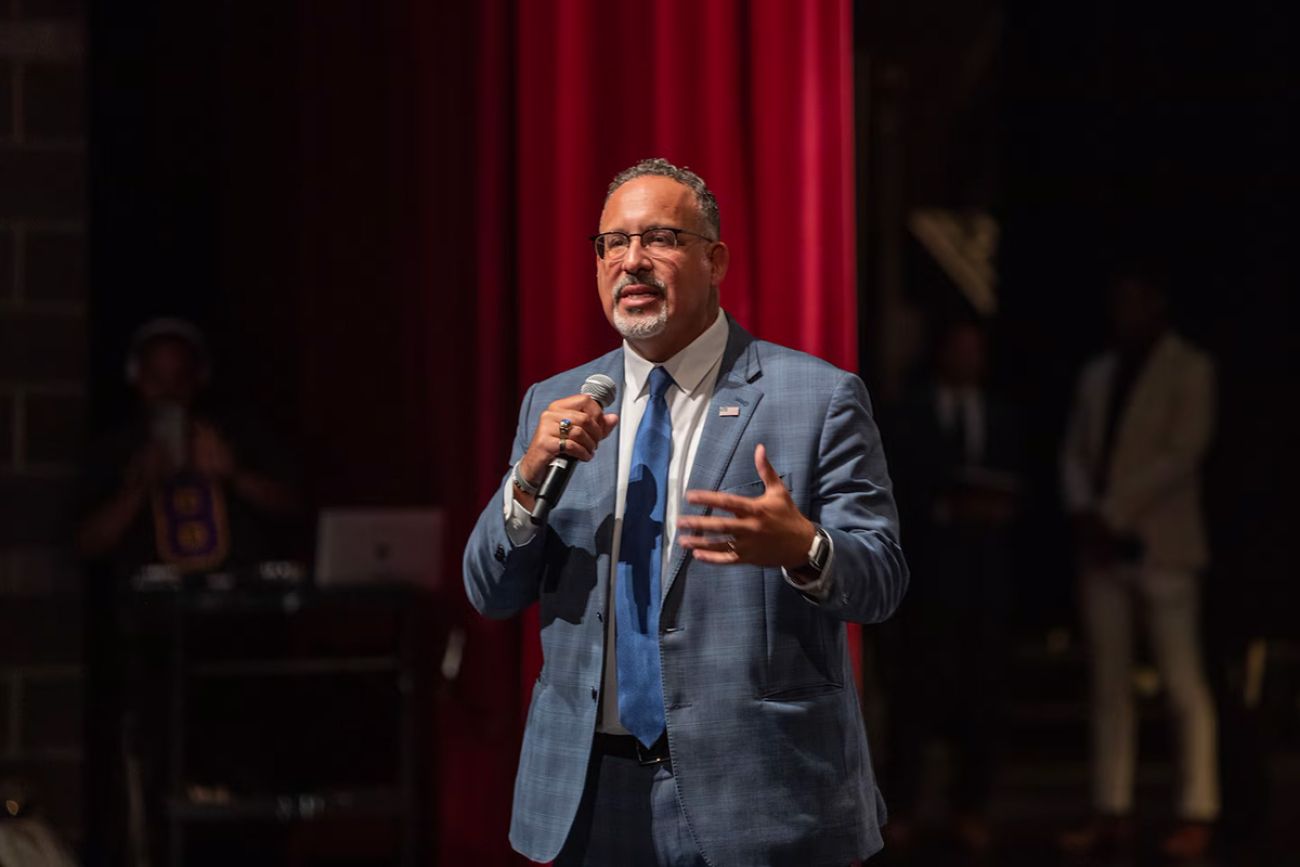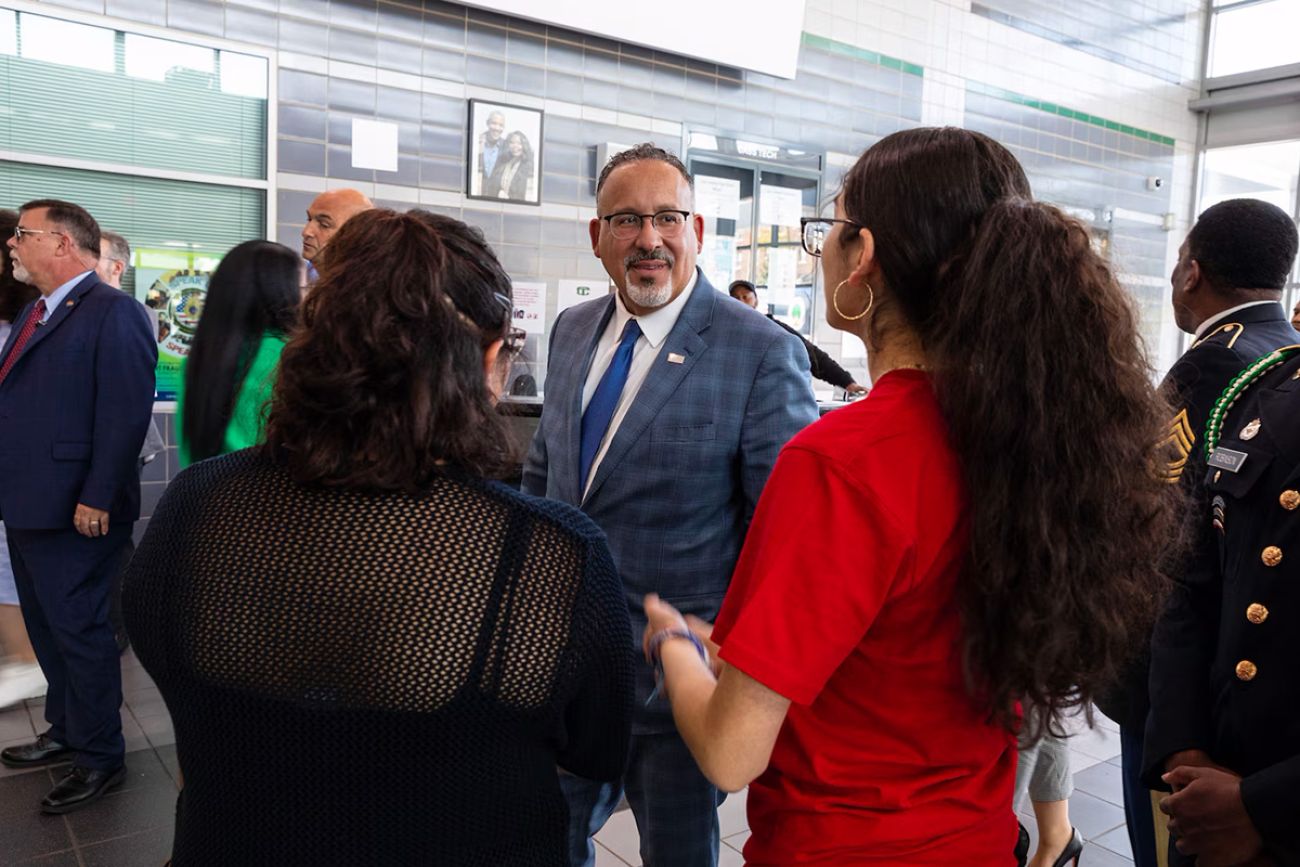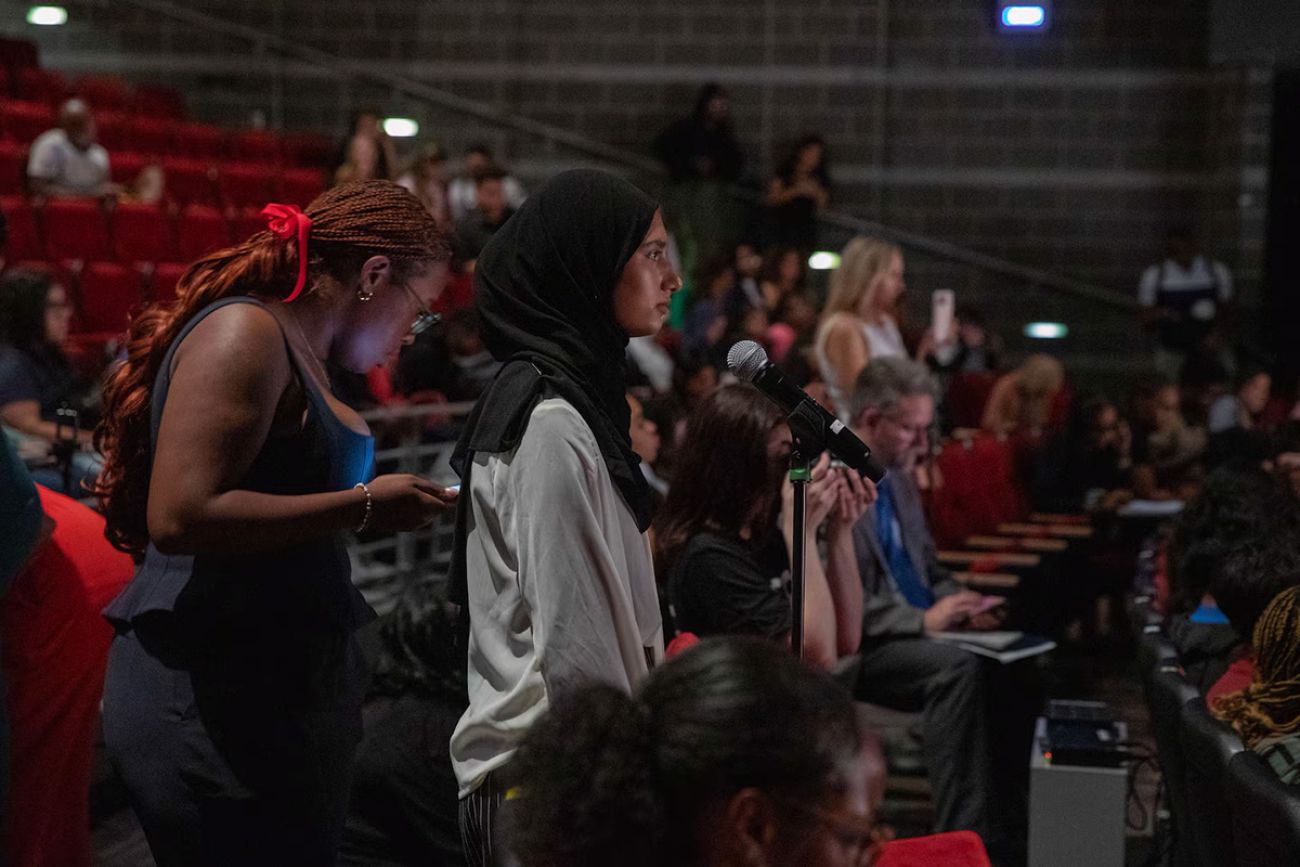Ed Secretary touts mental health money for Michigan students. It expires soon

Sign up for Chalkbeat Detroit’s free daily newsletter to keep up with the city’s public school system and Michigan education policy.
Cass Technical High School students lined up to ask U.S. Secretary of Education Miguel Cardona questions about mental health programs on Thursday, one day after a deadly mass shooting at a Georgia high school.
Jordan Scott, a junior, asked Cardona, who stopped at the Detroit Public Schools Community District campus as part of his 2024 back-to-school bus tour, what the U.S. Department of Education is doing to monitor students’ mental health and keep kids safe from gun violence.
“We’re doing as much as we can,” Cardona said. “We have people who are more interested in protecting gun rights than children.
“We have people who will fight if we try to provide gun safety legislation but try to look the other way when children are murdered.”
Before taking questions from several students in a town hall-style presentation, Cardona toured the school and visited a couple of classrooms. Education leaders including State Superintendent Michael Rice and DPSCD Superintendent Nikolai Vitti were also in attendance.
Related:
- School is back in Michigan. So is COVID-19. What to know
- Back-to-school road safety tips for Michigan drivers, students and parents
- M-STEP results reveal struggles for Michigan kids who began school in COVID
When asked after the town hall what he thought about Michigan’s 91% percent cut to state grants for districts’ student mental health and school safety efforts this school year, Cardona said the country can no longer go back to a time when it dealt with students’ trauma after the fact.
“To think that we cannot continue to support students through mental health funding and programming and after school programming is not really taking into account where students are today and where our schools are today,” he said.

Nabiha Begum, a senior at Cass Tech, said she hadn’t heard about Michigan’s student mental health funding cut before Thursday.
“Honestly, it does make me quite angered,” she said. “All I want to ask is when will there be more effort to focus on students’ mental health instead of trying to just shun them?”
The last-minute $301.5 million reduction also surprised education leaders, who now worry that schools will have to lay off mental health and school safety personnel and cut existing programs.
Cardona also touted the federal government’s investments into student mental health during the pandemic with COVID relief funds for local districts. Those dollars are set to expire this month.
“It’s critically important that not only at the federal level, but at the state and local level, we don’t look at these programs as extra — that they’re part of the core program,” said Cardona.
The state’s cuts and the expiration of federal funding come at a time when youth mental health is still a national crisis. It predated the pandemic, and researchers say COVID compounded the problem.
An August report from the CDC showed some improvements for teen mental health from 2021 to 2023, including small decreases in the percentage of students who experienced persistent sadness or hopelessness and female students who seriously considered suicide.
But the report also found that the percentage of kids who experienced bullying increased from 15% to 19%, and the number of students who missed school due to safety concerns at school or on their routes to school increased from 9% to 13%.

In Michigan, reports of risks of student suicide increased by 43.7% in 2023 compared to 2022, according to data from OK2SAY, a state program that tracks anonymous tips of self-threatening behavior in schools.
During the same timeframe, reports of bullying increased by 31.6% and reports of drug use by 63.6%. Overall tips to the hotline, including reports of sexual violence and other mental health issues, increased by more than 31%.
Even before Michigan cut student mental health and safety funds for the 2024-25 school year, school mental health professionals said there weren’t enough staff to meet the growing needs of students.
Michigan hired more than 1,300 mental health staff since 2018, and Michigan had the third highest ratio of counselors to students in the nation during the 2021-22 school year.
At that time, the ratio was one counselor per every 615 students in Michigan, according to the American School Counselor Association. But the ASCA recommends a ratio of one counselor for every 215 students.
Before 2018, Michigan’s state school budget didn’t dedicate any money to districts dedicated to improving student mental health.
A 2023 study prepared for the Michigan Department of Education on the feasibility of building a comprehensive statewide school mental health system found that a lack of funding was the main barrier.

Administrators interviewed for the study were concerned about what would happen to the current mental health systems without the funding. They also said financial uncertainty prevented their districts from implementing all the features recommended for a comprehensive system.
The study also recommended that the MDE develop structures, processes, and guidance to support districts in creating a school mental health system.
Cass Tech senior Shinha Chanda said there’s an emotional strain on many young people who are coming of age during complicated times, and that school is “kind of” a stressor.
Begum, another Cass Tech senior, said she feels like most of the time society only cares about how kids are doing in school and blames poor performance on “not being a good student.”
“Most of the time, it’s deeper than that,” she said. “If they don’t get straight A’s, if they’re failing the class, it could be something deeper with their mental health.”
Begum said students can’t achieve academically when they are struggling emotionally.
“Why should we not focus on the students’ mental health as much as we do the curriculum?”
Hannah Dellinger covers K-12 education and state education policy for Chalkbeat Detroit. You can reach her at [email protected].
Michigan Education Watch
Michigan Education Watch is made possible by generous financial support from:
Subscribe to Michigan Education Watch
See what new members are saying about why they donated to Bridge Michigan:
- “In order for this information to be accurate and unbiased it must be underwritten by its readers, not by special interests.” - Larry S.
- “Not many other media sources report on the topics Bridge does.” - Susan B.
- “Your journalism is outstanding and rare these days.” - Mark S.
If you want to ensure the future of nonpartisan, nonprofit Michigan journalism, please become a member today. You, too, will be asked why you donated and maybe we'll feature your quote next time!






